Of the small number of Henry Hathaway films that I’ve seen, I haven’t cared much for any of his westerns, but I’m quite fond of his work in noir and thrillers. Niagara’s Technicolor vistas and Marilyn Monroe’s fantastic performance make that an enjoyable ride, while 14 Hours makes solid use of its ripped from the headlines story and ensemble of character actors. Call Northside 777 features many of those same strengths, like Niagara it’s got a great movie star turn in the central role, and like 14 Hours is takes a true story and embellishes it to great dramatic effect, sprinkling in some character actors giving solid work in meaty parts.
A reporter (James Stewart) is sent to investigate a classified ad seeking information about a decade old murder. The ad was placed by a wrongly convicted killer’s hopeful mother. Stewart’s initially sceptic about the prospects of the story, and the man’s innocence, but is encourage by his boss to keep digging deeper. The fact that the film will eventually prove this suspicion correct is no surprise, it practically telegraphs this detail from the very beginning.
What makes Call Northside 777 so special is how it deep dives into the mundane details of reporting. Much of the twists and turns rely upon Stewart’s discovery of evidence that is missing, or stories that don’t align correctly, the absence of information while providing lots of extraneous pieces. Much of the film relies less on sensational reveals than on gaining new bits of knowledge to create a new perspective on the events that have unfolded.
And Stewart plays it all beautifully. After returning to films from WWII service, Stewart had a rough few years trying to regain his footing. That doesn’t mean his performances were slouches, just that his box office strength wasn’t as impressive as it had been. I’ve always found his post-WWII work to be filled with superior choices of roles, collaborators, and stronger work. Call Northside 777 may not be one of his towering career heights, but it’s one of those surprising smaller movies that gets stuck in the valley between It’s a Wonderful Life and Harvey. And the two major supporting players, Lee J. Cobb and Richard Conte, may even surpass his work. Cobb essays the role of Stewart’s editor at the paper, a warm presence who keeps pushing for the story to go further in. And Conte is the framed man, all desperate and pleading for someone to help him prove that he was railroaded into his current state.
Call Northside 777
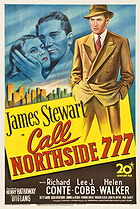 Posted : 10 years, 10 months ago on 11 August 2014 08:20
(A review of Call Northside 777)
Posted : 10 years, 10 months ago on 11 August 2014 08:20
(A review of Call Northside 777) 0 comments, Reply to this entry
0 comments, Reply to this entry
Bad Lieutenant
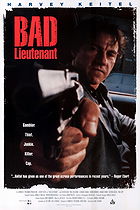 Posted : 10 years, 10 months ago on 11 August 2014 08:20
(A review of Bad Lieutenant)
Posted : 10 years, 10 months ago on 11 August 2014 08:20
(A review of Bad Lieutenant)Bad Lieutenant is like Mean Streets gone to rot, with the same manic energy fueled by rock ’n’ roll and narcotics, another story of New York City, Catholic guilt, and starring Harvey Keitel. Between the two, I think Scorsese’s opus of morally confused hoods is greater, but that doesn’t mean Bad Lieutenant is a slouch or fails to carry its own merits. It’s more like the sense of “more is more” can hit overload and fail to be shocking, winding up being dull in spots.
After a few moments in this man’s company, it’s very clear that he’s plunging through the numerous circles of hell with boulders tied to both ankles. By the time we’ve seen him ingest a copious amount of drugs, mess around with several hookers, and then sexually assaulting a teenager on the job, which may have been the moment I went “OK, I get it, he’s bad,” we know that there’s no real room for redemption in this life. Maybe in the next one, as Bad Lieutenant is equally mired in Catholicism as it is in relishing its exploitation bonafides.
After a while, watching the film gleefully view various despicable acts while butting heads with deeply religious imagery, it begins to dull its own impact. It’s envelope pushing just for the sake of it in spots, which is boring if there’s no deeper reasoning behind it. Yet Keitel’s committed and deeply felt performance works hard to effectively smooth over these various transitions, he always tries to find the heart and soul of this man in freefall, even if the film isn’t entirely sure or even bothered with the actual presence of those things. It does become harder to care about someone who is written as being anti-human, yet Keitel manages to make us invest our time and empathy with this man.
The fact that the film wants to play for redemption, but on its own black-hearted terms is admirable. There’s clearly no way for this guy to be redeemed, and he consistently seems on the edge of dying. How he goes could have ended up in several different ways – overdose, random act of violence, suicide, target of a hit. It doesn’t matter which, his life is too bleak for any light to shine through. And while I may have had some problems with many stylistic choices that the films made, one cannot argue with the fact that it played by the rules of its world from the first frame to the last. It’s a complete vision, not a pretty one, but a complete one.
After a few moments in this man’s company, it’s very clear that he’s plunging through the numerous circles of hell with boulders tied to both ankles. By the time we’ve seen him ingest a copious amount of drugs, mess around with several hookers, and then sexually assaulting a teenager on the job, which may have been the moment I went “OK, I get it, he’s bad,” we know that there’s no real room for redemption in this life. Maybe in the next one, as Bad Lieutenant is equally mired in Catholicism as it is in relishing its exploitation bonafides.
After a while, watching the film gleefully view various despicable acts while butting heads with deeply religious imagery, it begins to dull its own impact. It’s envelope pushing just for the sake of it in spots, which is boring if there’s no deeper reasoning behind it. Yet Keitel’s committed and deeply felt performance works hard to effectively smooth over these various transitions, he always tries to find the heart and soul of this man in freefall, even if the film isn’t entirely sure or even bothered with the actual presence of those things. It does become harder to care about someone who is written as being anti-human, yet Keitel manages to make us invest our time and empathy with this man.
The fact that the film wants to play for redemption, but on its own black-hearted terms is admirable. There’s clearly no way for this guy to be redeemed, and he consistently seems on the edge of dying. How he goes could have ended up in several different ways – overdose, random act of violence, suicide, target of a hit. It doesn’t matter which, his life is too bleak for any light to shine through. And while I may have had some problems with many stylistic choices that the films made, one cannot argue with the fact that it played by the rules of its world from the first frame to the last. It’s a complete vision, not a pretty one, but a complete one.
 0 comments, Reply to this entry
0 comments, Reply to this entry
Hoffa
 Posted : 10 years, 10 months ago on 11 August 2014 08:20
(A review of Hoffa (1992))
Posted : 10 years, 10 months ago on 11 August 2014 08:20
(A review of Hoffa (1992))A film about Jimmy Hoffa already has a leg-up on other films because its subject is so damn interesting. It’s a pity that Hoffa doesn’t bother with examining the man, instead preferring to stare up at him in awe, viewed through the eyes of someone else, with no insight or depth brought to the main character.
Yet this lack of insight into Hoffa’s reasoning or feelings behind his actions doesn’t come close to being the main problem with this film. The biggest problem with Hoffa is that it is quite simply imminently forgettable. For all of its lavish period details and ambitions of epic scope and scale, Hoffa does not bother with critical thinking about its subject matter, never mines much depth of the rich dramatic ground it covers. And it places Hoffa in a secondary role to Danny DeVito’s best friend, who just so happens to be present at every important event.
One cannot fault DeVito’s eye as a director, for much of the film looks handsome, but one does wish that he had taken a point-of-view about this material and gone with that. Luckily, he has Nicholson in the titular role, trying valiantly to spin straw into gold. Normally the marriage of Nicholson and David Mamet would excite me, but between this and The Postman Always Rings Twice, I’m left wondering why they seem to cancel each other out. Mamet’s script needed a more clear vision, why is he telling the story of this man? What insights can he bring us about his journey? Hoffa, like many biopics before and since, is too scattershot, too eager to hit the big events of this person’s life, preferring to take a controversial figure and change their lives into a greatest hits package, and nothing more.
Yet this lack of insight into Hoffa’s reasoning or feelings behind his actions doesn’t come close to being the main problem with this film. The biggest problem with Hoffa is that it is quite simply imminently forgettable. For all of its lavish period details and ambitions of epic scope and scale, Hoffa does not bother with critical thinking about its subject matter, never mines much depth of the rich dramatic ground it covers. And it places Hoffa in a secondary role to Danny DeVito’s best friend, who just so happens to be present at every important event.
One cannot fault DeVito’s eye as a director, for much of the film looks handsome, but one does wish that he had taken a point-of-view about this material and gone with that. Luckily, he has Nicholson in the titular role, trying valiantly to spin straw into gold. Normally the marriage of Nicholson and David Mamet would excite me, but between this and The Postman Always Rings Twice, I’m left wondering why they seem to cancel each other out. Mamet’s script needed a more clear vision, why is he telling the story of this man? What insights can he bring us about his journey? Hoffa, like many biopics before and since, is too scattershot, too eager to hit the big events of this person’s life, preferring to take a controversial figure and change their lives into a greatest hits package, and nothing more.
 0 comments, Reply to this entry
0 comments, Reply to this entry
Party Monster
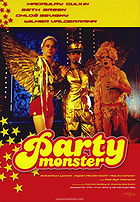 Posted : 10 years, 11 months ago on 3 August 2014 02:07
(A review of Party Monster)
Posted : 10 years, 11 months ago on 3 August 2014 02:07
(A review of Party Monster)Camp can be wildly entertaining when utilized effectively, but Party Monster turns camp affectation into lurid displays of violence and becomes a case of too much growing tedious. It’s all crazy pageantry of costumes, trying to establish a style and relish in it, and offering not much of substance to chew on about a real-life case that was fascinating, and a scene that was even more interesting. Party Monster manages to make the Club Kids look ugly and bothersome more than anything else.
Thankfully, Party Monster has a strong lead performance in Seth Green as James St. James, portraying him as a self-deluded, grandiose variation of Oscar Wilde, only pumped full of designer drugs and ornate costuming. He manages to find and continuously strike the delicate balance between camp and pathos that none of the other actors can manage. I would call it a star making performance, but Green had been consistently working in television and films since he was a child.
Macaulay Culkin was trying to make a comeback and move away from his child star image around this time, so a role like Michael Alig and a project like Party Monster seemed like a great idea to complete both of these tasks. While Culkin was incredibly attractive around this time, he was also less confident in the actual performance. He never finds his footing, only skimming the surface and preferring to strike poses and deliver his lines in a put upon cadence than developing a real character. The contrast between Culkin’s work and Green’s is night and day. One of them is giving a thought-out development of the character and the other is merely playing dress-up.
But maybe the greatest sin of the film isn’t just its over indulgence in theatrics with no real payoff, but that it makes everything look ugly. Even before the preordained fall of these stories, the Club Kids and their nirvana of strange parties and dancefloors never seemed particularly inviting or exciting. It just looks muted and garish. And the film never gives us a clearer point-of-view besides trying out a faux-documentary approach from time-to-time. Highlighting some of the absurdity of the case would have been better, or going from day-glo Wonderland to a garish paradise lost would have been more effective. Anything other than hammering home the fact that too much of something is bad for you and needlessly tedious.
Thankfully, Party Monster has a strong lead performance in Seth Green as James St. James, portraying him as a self-deluded, grandiose variation of Oscar Wilde, only pumped full of designer drugs and ornate costuming. He manages to find and continuously strike the delicate balance between camp and pathos that none of the other actors can manage. I would call it a star making performance, but Green had been consistently working in television and films since he was a child.
Macaulay Culkin was trying to make a comeback and move away from his child star image around this time, so a role like Michael Alig and a project like Party Monster seemed like a great idea to complete both of these tasks. While Culkin was incredibly attractive around this time, he was also less confident in the actual performance. He never finds his footing, only skimming the surface and preferring to strike poses and deliver his lines in a put upon cadence than developing a real character. The contrast between Culkin’s work and Green’s is night and day. One of them is giving a thought-out development of the character and the other is merely playing dress-up.
But maybe the greatest sin of the film isn’t just its over indulgence in theatrics with no real payoff, but that it makes everything look ugly. Even before the preordained fall of these stories, the Club Kids and their nirvana of strange parties and dancefloors never seemed particularly inviting or exciting. It just looks muted and garish. And the film never gives us a clearer point-of-view besides trying out a faux-documentary approach from time-to-time. Highlighting some of the absurdity of the case would have been better, or going from day-glo Wonderland to a garish paradise lost would have been more effective. Anything other than hammering home the fact that too much of something is bad for you and needlessly tedious.
 0 comments, Reply to this entry
0 comments, Reply to this entry
The Deep End
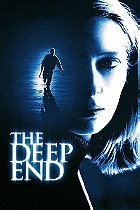 Posted : 10 years, 11 months ago on 3 August 2014 02:07
(A review of The Deep End)
Posted : 10 years, 11 months ago on 3 August 2014 02:07
(A review of The Deep End)A modern noir in which a mother must protect her teenage son from a blackmailer who has a videotape in which he can be seen having sex with a much older man, an older man who has just been found dead and had questionable taste in friends. The Deep End is a solid noir with a twisting plot and solid lead actress in the great Tilda Swinton, and strong supporting roles for Jonathan Tucker, Josh Lucas, and Goran Visnjic. Though it must be said, The Deep End is mostly an excuse to indulge in the noir trope of watching a brittle woman slowly break over time.
The film never finds that extra spark that allows it go from very commendable, strongly made work to superlative, but it’s smart to play all of its major chips on Swinton’s shoulders. She makes every tiny shift from composed to frantic to a nervous breakdown and back with ease and skill that makes it look as if she isn’t even acting at all. While the story hits every plot turn you would expect, Swinton makes it feel real and lived in, her very presence keeps the ante high and clearly visible.
Yet the film crumbles when the main heavy is revealed. Josh Lucas’s brief time as the older man who very existence and dangerous sexual charisma appear to threaten mother and son lingers in the mind despite his short screen time. So Raymond Barry had a big task in crafting a man who seemed like a credible enough threat to blow Lucas from the memory and go toe-to-toe with Swinton, and he doesn’t live up to the task at hand. Visnjic begins as his second-in-command before slowly switching sides and crumbling to the moral complexity of his actions. Visnjic needed to appear mysterious and then change to supportive, and he does a fine job with this. Barry needed to appear calm, in control, and quietly threatening, but The Deep End stumbles here. It’s the major crime keeping the film from making that extra leap from very good to great.
The film never finds that extra spark that allows it go from very commendable, strongly made work to superlative, but it’s smart to play all of its major chips on Swinton’s shoulders. She makes every tiny shift from composed to frantic to a nervous breakdown and back with ease and skill that makes it look as if she isn’t even acting at all. While the story hits every plot turn you would expect, Swinton makes it feel real and lived in, her very presence keeps the ante high and clearly visible.
Yet the film crumbles when the main heavy is revealed. Josh Lucas’s brief time as the older man who very existence and dangerous sexual charisma appear to threaten mother and son lingers in the mind despite his short screen time. So Raymond Barry had a big task in crafting a man who seemed like a credible enough threat to blow Lucas from the memory and go toe-to-toe with Swinton, and he doesn’t live up to the task at hand. Visnjic begins as his second-in-command before slowly switching sides and crumbling to the moral complexity of his actions. Visnjic needed to appear mysterious and then change to supportive, and he does a fine job with this. Barry needed to appear calm, in control, and quietly threatening, but The Deep End stumbles here. It’s the major crime keeping the film from making that extra leap from very good to great.
 0 comments, Reply to this entry
0 comments, Reply to this entry
In & Out
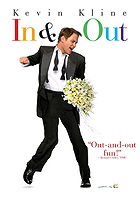 Posted : 10 years, 11 months ago on 3 August 2014 02:07
(A review of In & Out)
Posted : 10 years, 11 months ago on 3 August 2014 02:07
(A review of In & Out)Man, it’s hard to remember that there was a time when the very existence of a movie like In & Out, with it’s message of tolerance for homosexuality, was some kind of radical idea. Despite falling in line with the general treatment of gay men as sweet, supportive eunuchs, In & Out gained attention for even broaching the subject. Oh, and there’s a blink-and-miss-it kiss between Kevin Kline and Tom Selleck.
Broadly written, directed, and acted by all involved, In & Out does have a few things going for it to recommend it. Kline’s lead performance finds a nice center on which it can manically spin around. Debbie Reynolds, Wilford Brimley, and Bob Newhart offer strong support ranging from Reynolds’s motherly panic and obsession with getting a wedding (who is getting married doesn’t matter, so long as she gets one), while Brimley offers quiet support and the occasional sarcastic quip. But the movie truly belongs to Joan Cusack in a comedic riff on a woman on the verge of a nervous breakdown. Her drunken screaming for any random passerby to marry her while still wearing her wedding dress is a memorable moment, but Cusack makes the most of every moment. And Matt Dillon may just be a terribly underrated comedic actor, given not just his work here but in There’s Something About Mary a few years later.
But that’s about all In & Out really is – a broadly played sitcom expanded out to feature length and given a tony cast of players. The gay panic of the town is poked fun of, and homosexuality is presented as being another version of normal, but it would have been truly transgressive if it had displayed a fully realized gay character with sexual desires and agency. Maybe that was too much for audiences in a mainstream comedy in 1997, but Will & Grace and Queer as Folk were just around the corner on television. For good and bad, In & Out has a place in the gay film pantheon for coming out at a time in which public perception about the LGBT community started to slowly change from a negative one to a positive one.
Broadly written, directed, and acted by all involved, In & Out does have a few things going for it to recommend it. Kline’s lead performance finds a nice center on which it can manically spin around. Debbie Reynolds, Wilford Brimley, and Bob Newhart offer strong support ranging from Reynolds’s motherly panic and obsession with getting a wedding (who is getting married doesn’t matter, so long as she gets one), while Brimley offers quiet support and the occasional sarcastic quip. But the movie truly belongs to Joan Cusack in a comedic riff on a woman on the verge of a nervous breakdown. Her drunken screaming for any random passerby to marry her while still wearing her wedding dress is a memorable moment, but Cusack makes the most of every moment. And Matt Dillon may just be a terribly underrated comedic actor, given not just his work here but in There’s Something About Mary a few years later.
But that’s about all In & Out really is – a broadly played sitcom expanded out to feature length and given a tony cast of players. The gay panic of the town is poked fun of, and homosexuality is presented as being another version of normal, but it would have been truly transgressive if it had displayed a fully realized gay character with sexual desires and agency. Maybe that was too much for audiences in a mainstream comedy in 1997, but Will & Grace and Queer as Folk were just around the corner on television. For good and bad, In & Out has a place in the gay film pantheon for coming out at a time in which public perception about the LGBT community started to slowly change from a negative one to a positive one.
 0 comments, Reply to this entry
0 comments, Reply to this entry
But I'm a Cheerleader
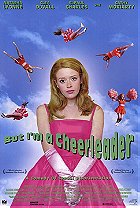 Posted : 10 years, 11 months ago on 3 August 2014 02:07
(A review of But I'm a Cheerleader)
Posted : 10 years, 11 months ago on 3 August 2014 02:07
(A review of But I'm a Cheerleader)When I first saw But I’m a Cheerleader in the early 2000s on either IFC or Sundance, I couldn’t tell you which one honestly, I thought the entire concept was a subversive satirical look at gay panic. The film reminded me of John Waters in many aspects; I held it close to my heart. Then I learned that “pray the gay away” camps were a real thing, and much of the black humor suddenly didn’t seem so damn funny.
So coming back to it after a very long period, I was surprised that some of my opinions had changed about it, but I still find it very hard to laugh at some of the conversion therapy on display. But I’m a Cheerleader does take humorous jabs at gender performance and the flexibility of sexual attraction. The camp trades in antiquated ideas about gender roles and identities, demonstrating how much of what we think about gender roles are enabled, constructed, and enforced by society. It helps that our main character is a good Christian cheerleader, by forcing a girl who seems like the prototypical ideal for a heteronormative lifestyle engage in exercises which make her feel at odds with their goals is a smart choice to underline the satire.
Yet you can’t escape the fact that these camps exist, and what these kids are being forced into is ugly and damaging. Every opportunity is taken and expanded to make it funny, to make it ridiculous and try to take away its power, but in 2014, the GOP in a few states wrote conversion therapy into belief core. Try as the film might to make traditional gender roles and the normalization of heterosexuality into a foreign concept, effectively trying to make it seem as queer as being queer, there’s a bitter aftertaste that lingers. While RuPaul as a camp counselor instructing young boys into becoming a 50s housewife ideal mate is funny, the fact that the assortment of gay males are various stereotypes and nothing more is not.
I haven’t settled my debate about But I’m a Cheerleader. I enjoy that the two main female characters are given agency, complicated motivations, and tender romantic scenes, and that Clea Duvall and Natasha Lyonne brilliantly play them both. But that bitter aftertaste takes away a lot of the enjoyment of the gags, cleverness of the points its making, and leaves me generally confused. It’s a cult film, and I enjoy it mightily, but with a few caveats.
So coming back to it after a very long period, I was surprised that some of my opinions had changed about it, but I still find it very hard to laugh at some of the conversion therapy on display. But I’m a Cheerleader does take humorous jabs at gender performance and the flexibility of sexual attraction. The camp trades in antiquated ideas about gender roles and identities, demonstrating how much of what we think about gender roles are enabled, constructed, and enforced by society. It helps that our main character is a good Christian cheerleader, by forcing a girl who seems like the prototypical ideal for a heteronormative lifestyle engage in exercises which make her feel at odds with their goals is a smart choice to underline the satire.
Yet you can’t escape the fact that these camps exist, and what these kids are being forced into is ugly and damaging. Every opportunity is taken and expanded to make it funny, to make it ridiculous and try to take away its power, but in 2014, the GOP in a few states wrote conversion therapy into belief core. Try as the film might to make traditional gender roles and the normalization of heterosexuality into a foreign concept, effectively trying to make it seem as queer as being queer, there’s a bitter aftertaste that lingers. While RuPaul as a camp counselor instructing young boys into becoming a 50s housewife ideal mate is funny, the fact that the assortment of gay males are various stereotypes and nothing more is not.
I haven’t settled my debate about But I’m a Cheerleader. I enjoy that the two main female characters are given agency, complicated motivations, and tender romantic scenes, and that Clea Duvall and Natasha Lyonne brilliantly play them both. But that bitter aftertaste takes away a lot of the enjoyment of the gags, cleverness of the points its making, and leaves me generally confused. It’s a cult film, and I enjoy it mightily, but with a few caveats.
 0 comments, Reply to this entry
0 comments, Reply to this entry
Snowpiercer
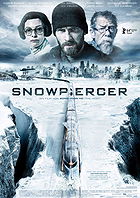 Posted : 10 years, 11 months ago on 29 July 2014 04:53
(A review of Snowpiercer)
Posted : 10 years, 11 months ago on 29 July 2014 04:53
(A review of Snowpiercer)Leave it to a foreign director working with an international cast and adapting a French graphic novel to make the most audacious and intelligent science-fiction film in a long time. It’s a downer of a film, frequently diverting into absurd territory, punctuated by moments of satire and unafraid of balancing out poetic images with brutal violence. It may not always smoothly traverse the different tones or twists and turns in the story, but I give it high-praise for even bothering to try it out.
Rarely does a film emerge from the hands of the Weinstein Company without numerous edits and obvious bits of interference. So a round of applause is in order to Korean director Boon Jong-Ho for sticking it to them and demanding that his original vision without compromises or edits make it to the screen. That he won is a wonderful bit of kismet, but the downside was Harvey Weinstein’s wrath – dumping the film with a small scale release and limited promotion.
Pity, this film deserves to find a larger audience. I loved every moment of its audacious choices, whether or not they turned out to be fully formed ideas or half-formed sketches is beside the point. Snowpiercer is a film that makes a never-ending train ride to nowhere in particular seem like its own brand of hell, and exactly like our current political and social landscape. As the Have-Nots struggle and try to revolt for a piece of the Haves, the film echoes various revolutions and uses that ideology to slowly unfold a darkly satiric film.
The only true point at which the film threatened to lose me was when we came upon the conclusion to the story, which ended up in a different location than I thought it was willing and ready to go. If the film had ended with the destruction of the train, Snowpiercer would have had more philosophical impact and allegorical weight. The only way to save humanity at this point would be to destroy the existing structures and start again. But it continues to go on, and that ending is a bizarre choice which feels too hopeful and optimistic for such a downbeat movie. It didn’t torpedo the film for me, but it did take some of the varnish off of it.
Jong-Ho has assembled an interesting cast, and I mean that as high praise. Each of them brings a unique voice and tone to the film, even if a few them aren’t given much to do, they bring a certain spark or energy to their scenes. The mixture sees Oscar winners (Octavia Spencer, Tilda Swinton), living legends (John Hurt, Ed Harris), character actors (Jamie Bell, Ewen Bremmer, Luke Pasqualino), and a few international stars (Ah-sung Ko, Kang-ho Song, Emma Levie). Alison Pill shows up in a single scene, one that is so gonzo and brilliant that it may just be the highlight of the film. Pill’s uber-perky facial contortions lead into a shootout, and she sells the hell out of the material while simultaneously making the case that she needs to be given bigger, better roles in the future. (Of course, I felt this way after her scene-stealing in Scott Pilgrim and Midnight in Paris.)
But Snowpiercer’s greatest asset is Chris Evans. Best known for playing Captain America in the Marvel Cinematic Universe, Evans is really developing a talent for playing conflicted heroes who lead the troops into battle. Of course, Marvel would never let Evans go as dark in those films as he does here. Maybe Snowpiercer will be the film that cements Evans as more than a pretty face (and body, but I digress…). A monolog late in the film sees Evans pour out year’s worth of guilt and resentments, and he’s mesmerizing to watch. Even better is a climactic scene in which he is tempted to become the new head of the ever-moving train, abandoning his mission and joining the 1% at the very top of the food chain. You can see his breakdown of everything he’s ever believed, every piece of faith in his revolution and mission, that moment of great temptation in which our savior may very well indeed go dark.
What Snowpiercer lacks in subtlety, which is doesn’t even bother with by and large, it makes up for with a sense of imminent danger and unpredictability. It’s almost cruel how quickly it dispenses with characters who seem like they’re destined to make it to the final reel, frequently killing them off in ways that are indifferent or indistinct before realizing that, yes, that character truly did die. Swinton’s callous minister reminds them that they must always know and keep their place, and her character is practically the symbol for the entirety of the film’s political allegory. She is misplaced superiority, a violent moral authority, and severely lacking in compassion, she wouldn’t seem out of place at a Tea Party rally or delivering quips on Fox & Friends.
It used to be that science-fiction took modern day problems and reflected and refracted them in strange, intelligent ways. Somewhere along the way it turned into lasers blowing shit up in the space real pretty, and while that can have its charms, it’s exhausting when year after year that is the only meal option being given to you. It was exciting to see 2014 give us smart comic book movies in Captain America: The Winter Soldier, a monster-fest in Godzilla, but I think Snowpiercer will be the one to go the distance in the end. Inch by tenuous and hard-fought inch, we climb forward in the train, wondering what strange vision will greet us next. While the ending may be a strange place to exit the journey, what a ride it was to get there.
Rarely does a film emerge from the hands of the Weinstein Company without numerous edits and obvious bits of interference. So a round of applause is in order to Korean director Boon Jong-Ho for sticking it to them and demanding that his original vision without compromises or edits make it to the screen. That he won is a wonderful bit of kismet, but the downside was Harvey Weinstein’s wrath – dumping the film with a small scale release and limited promotion.
Pity, this film deserves to find a larger audience. I loved every moment of its audacious choices, whether or not they turned out to be fully formed ideas or half-formed sketches is beside the point. Snowpiercer is a film that makes a never-ending train ride to nowhere in particular seem like its own brand of hell, and exactly like our current political and social landscape. As the Have-Nots struggle and try to revolt for a piece of the Haves, the film echoes various revolutions and uses that ideology to slowly unfold a darkly satiric film.
The only true point at which the film threatened to lose me was when we came upon the conclusion to the story, which ended up in a different location than I thought it was willing and ready to go. If the film had ended with the destruction of the train, Snowpiercer would have had more philosophical impact and allegorical weight. The only way to save humanity at this point would be to destroy the existing structures and start again. But it continues to go on, and that ending is a bizarre choice which feels too hopeful and optimistic for such a downbeat movie. It didn’t torpedo the film for me, but it did take some of the varnish off of it.
Jong-Ho has assembled an interesting cast, and I mean that as high praise. Each of them brings a unique voice and tone to the film, even if a few them aren’t given much to do, they bring a certain spark or energy to their scenes. The mixture sees Oscar winners (Octavia Spencer, Tilda Swinton), living legends (John Hurt, Ed Harris), character actors (Jamie Bell, Ewen Bremmer, Luke Pasqualino), and a few international stars (Ah-sung Ko, Kang-ho Song, Emma Levie). Alison Pill shows up in a single scene, one that is so gonzo and brilliant that it may just be the highlight of the film. Pill’s uber-perky facial contortions lead into a shootout, and she sells the hell out of the material while simultaneously making the case that she needs to be given bigger, better roles in the future. (Of course, I felt this way after her scene-stealing in Scott Pilgrim and Midnight in Paris.)
But Snowpiercer’s greatest asset is Chris Evans. Best known for playing Captain America in the Marvel Cinematic Universe, Evans is really developing a talent for playing conflicted heroes who lead the troops into battle. Of course, Marvel would never let Evans go as dark in those films as he does here. Maybe Snowpiercer will be the film that cements Evans as more than a pretty face (and body, but I digress…). A monolog late in the film sees Evans pour out year’s worth of guilt and resentments, and he’s mesmerizing to watch. Even better is a climactic scene in which he is tempted to become the new head of the ever-moving train, abandoning his mission and joining the 1% at the very top of the food chain. You can see his breakdown of everything he’s ever believed, every piece of faith in his revolution and mission, that moment of great temptation in which our savior may very well indeed go dark.
What Snowpiercer lacks in subtlety, which is doesn’t even bother with by and large, it makes up for with a sense of imminent danger and unpredictability. It’s almost cruel how quickly it dispenses with characters who seem like they’re destined to make it to the final reel, frequently killing them off in ways that are indifferent or indistinct before realizing that, yes, that character truly did die. Swinton’s callous minister reminds them that they must always know and keep their place, and her character is practically the symbol for the entirety of the film’s political allegory. She is misplaced superiority, a violent moral authority, and severely lacking in compassion, she wouldn’t seem out of place at a Tea Party rally or delivering quips on Fox & Friends.
It used to be that science-fiction took modern day problems and reflected and refracted them in strange, intelligent ways. Somewhere along the way it turned into lasers blowing shit up in the space real pretty, and while that can have its charms, it’s exhausting when year after year that is the only meal option being given to you. It was exciting to see 2014 give us smart comic book movies in Captain America: The Winter Soldier, a monster-fest in Godzilla, but I think Snowpiercer will be the one to go the distance in the end. Inch by tenuous and hard-fought inch, we climb forward in the train, wondering what strange vision will greet us next. While the ending may be a strange place to exit the journey, what a ride it was to get there.
 0 comments, Reply to this entry
0 comments, Reply to this entry
Muppet Treasure Island
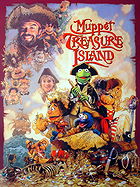 Posted : 10 years, 11 months ago on 29 July 2014 04:53
(A review of Muppet Treasure Island)
Posted : 10 years, 11 months ago on 29 July 2014 04:53
(A review of Muppet Treasure Island)It’s nearly impossible to mess up a film with the Muppets, especially one that simply plugs them into an already existing story like in Muppet Treasure Island. That doesn’t mean every single movie is going to be golden, and Muppet Treasure Island is definitely a bronze medal entry.
There’s a few funny gags, and the musicals numbers are filled with the same sense of anarchic glee even if they’re in service of unmemorable songs, and Tim Curry hams it up with his brand of over-the-top braggadocio. Yet there’s still a certain spark missing from Muppet Treasure Island, and I can’t quite put my finger on what it is. Maybe it’s just an overall feeling of a weaker script? There is nowhere near enough Miss Piggy for my tastes. Gonzo and Rizzo can make for a lively duo when effectively used, but the script doesn’t want to give them enough winking humor and fourth-wall breaking gags. Billy Connolly and Jennifer Saunders are both horribly underutilized, despite giving it their all in their too brief time on screen.
So praise be to Curry for out-acting and over-emoting the entire lot of Muppets every chance he gets, because he’s a real livewire here, consistently giving the film energy and life whenever its gags fall flat or timing feels off. A Muppet movie is a formula that can’t fail, but that doesn’t mean it always succeeds. Instead we get varying levels of good, for every classic (The Muppets or The Muppet Movie), we get oddball entries that aren’t bad, but they aren’t the Muppets at their brightest either. Here is one of those movies.
There’s a few funny gags, and the musicals numbers are filled with the same sense of anarchic glee even if they’re in service of unmemorable songs, and Tim Curry hams it up with his brand of over-the-top braggadocio. Yet there’s still a certain spark missing from Muppet Treasure Island, and I can’t quite put my finger on what it is. Maybe it’s just an overall feeling of a weaker script? There is nowhere near enough Miss Piggy for my tastes. Gonzo and Rizzo can make for a lively duo when effectively used, but the script doesn’t want to give them enough winking humor and fourth-wall breaking gags. Billy Connolly and Jennifer Saunders are both horribly underutilized, despite giving it their all in their too brief time on screen.
So praise be to Curry for out-acting and over-emoting the entire lot of Muppets every chance he gets, because he’s a real livewire here, consistently giving the film energy and life whenever its gags fall flat or timing feels off. A Muppet movie is a formula that can’t fail, but that doesn’t mean it always succeeds. Instead we get varying levels of good, for every classic (The Muppets or The Muppet Movie), we get oddball entries that aren’t bad, but they aren’t the Muppets at their brightest either. Here is one of those movies.
 0 comments, Reply to this entry
0 comments, Reply to this entry
Close Encounters of the Third Kind
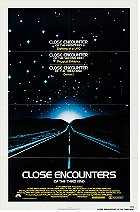 Posted : 10 years, 11 months ago on 29 July 2014 04:53
(A review of Close Encounters of the Third Kind)
Posted : 10 years, 11 months ago on 29 July 2014 04:53
(A review of Close Encounters of the Third Kind)I know I’m going to get plenty of side-eyes and comments telling me that I’m crazy, but I just don’t see what’s so great about Close Encounters of the Third Kind. I find much of it interminably dull, it’s depiction of aliens at odds with itself, but it’s saved by impeccable craft and a great leading performance from Richard Dreyfuss.
I think the main problem with Close Encounters is that none of the main characters are terribly compelling or fleshed out enough to wrap me up in their supposed complex emotional states. They speak and act in goopy mystical exchanges, any depth doesn’t come from within their characters as written but from the plot machinations as needed. Even then, only Dreyfuss as Roy Neary really gets anything juicy to chew on as an actor. The plot is thin, at 135 minutes it feels padded and like it could use a quick edit to tighten up its structure, and the characters are even thinner.
But it just seems such a strange choice to depict the actions of a man who goes dark, becomes obsessed with the possibility of flickering lights in the sky, practically cheats on his wife, and then abandons them to run off with the aliens in the end as one of child-like wonder and spectacle. Terri Garr’s suffering wife is a badly needed dose of reality, and once she exits for saner living situations, Close Encounters goes head-first into the story of a selfish man who abandons his loved ones for a possibility of extraterrestrial life. Having been a child abandoned by a father for dubious reasons, I don’t see much amazement, sympathy, or wonder in that choice.
Nor do I truly see a consistent presentation of the aliens. By turns they are kindly, coming in peace during the climatic moments, yet they also kidnap a child from a frantic mother desperate to keep him locked inside. No reason is given for why the aliens have chosen these people, or this particular time, to reveal their existence, but I’m not sure one could be given that is satisfactory. A moment of doubt or judgment on Dreyfuss’s sanity as a character would be most welcome, but the film plays it sympathetic to him at all times. I will grant Close Encounters a refreshing choice of making the interaction between extraterrestrial life and ours a peaceful one instead of one of violence and planetary conquest.
For all of my problems with the story choices of Close Encounters, one cannot impeach its craft. The special effects are still wondrous after nearly 40 years. The aliens themselves are unimpressive, but the spaceships are idiosyncratic and seem to lack basic human concepts of engineering, always a smart choice. And John Williams offers an emotional highpoint with his score, reminding me that there was a time when he was one of the best in the business long before he began to repeat himself. For me, Close Encounters can’t compare to the thrill-house adventure rides of other Spielberg works like Jaws, Jurassic Park, or Raiders of the Lost Ark. It’s a terrific bit of movie-making technique, but that’s about all it is for me.
I think the main problem with Close Encounters is that none of the main characters are terribly compelling or fleshed out enough to wrap me up in their supposed complex emotional states. They speak and act in goopy mystical exchanges, any depth doesn’t come from within their characters as written but from the plot machinations as needed. Even then, only Dreyfuss as Roy Neary really gets anything juicy to chew on as an actor. The plot is thin, at 135 minutes it feels padded and like it could use a quick edit to tighten up its structure, and the characters are even thinner.
But it just seems such a strange choice to depict the actions of a man who goes dark, becomes obsessed with the possibility of flickering lights in the sky, practically cheats on his wife, and then abandons them to run off with the aliens in the end as one of child-like wonder and spectacle. Terri Garr’s suffering wife is a badly needed dose of reality, and once she exits for saner living situations, Close Encounters goes head-first into the story of a selfish man who abandons his loved ones for a possibility of extraterrestrial life. Having been a child abandoned by a father for dubious reasons, I don’t see much amazement, sympathy, or wonder in that choice.
Nor do I truly see a consistent presentation of the aliens. By turns they are kindly, coming in peace during the climatic moments, yet they also kidnap a child from a frantic mother desperate to keep him locked inside. No reason is given for why the aliens have chosen these people, or this particular time, to reveal their existence, but I’m not sure one could be given that is satisfactory. A moment of doubt or judgment on Dreyfuss’s sanity as a character would be most welcome, but the film plays it sympathetic to him at all times. I will grant Close Encounters a refreshing choice of making the interaction between extraterrestrial life and ours a peaceful one instead of one of violence and planetary conquest.
For all of my problems with the story choices of Close Encounters, one cannot impeach its craft. The special effects are still wondrous after nearly 40 years. The aliens themselves are unimpressive, but the spaceships are idiosyncratic and seem to lack basic human concepts of engineering, always a smart choice. And John Williams offers an emotional highpoint with his score, reminding me that there was a time when he was one of the best in the business long before he began to repeat himself. For me, Close Encounters can’t compare to the thrill-house adventure rides of other Spielberg works like Jaws, Jurassic Park, or Raiders of the Lost Ark. It’s a terrific bit of movie-making technique, but that’s about all it is for me.
 0 comments, Reply to this entry
0 comments, Reply to this entry
 Login
Login
 Home
Home 95 Lists
95 Lists 1531 Reviews
1531 Reviews Collections
Collections